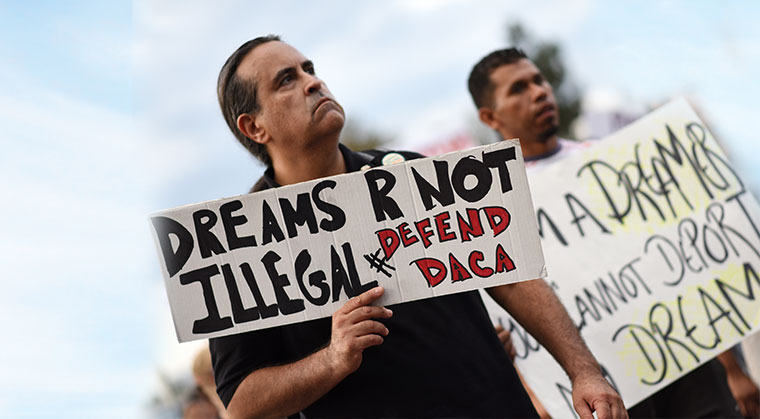A Deadline for DACA looms

Will Congress stump up for Trump’s border wall to protect the Dreamers?

P
resident Trump said last week that he would consider offering citizenship to the so-called “dreamers,” a select group of children of illegal immigrants, over a 10- to 12-year period. Who are these dreamers, and what is the Deferred Action for Childhood Arrivals (DACA) program that protects them?
What is DACA?
President Obama created the program by executive order in 2012, but the outlines were already in place in a bill called the Dream Act, first introduced in 2001, that repeatedly failed to pass Congress. DACA is an immigration program that allows certain children who entered the United States illegally to receive protection against deportation as well as temporary work permits. DACA recipients must renew their status every two years.
The majority of immigrants to whom DACA applies originate from Mexico. The program grants the dreamers legal status, but does not provide a path to citizenship. In September, President Trump announced his intention to end the program, telling Congress that it must come up with an immigration fix and declaring that Obama’s use of an executive order to protect the immigrants was unconstitutional.
Why is the issue in the headlines now?
The Trump administration gave Congress six months to produce new immigration legislation, a deadline that ends on March 5. The recent legislative battle that resulted in a three-day government shutdown was largely over how to deal with these DACA cases.
How many children are we talking about?
About 800,000. In order to be eligible to receive legal status, the applicant must be between 15 and 36 and must have entered the United States before the age of 16. The applicant must have a clean criminal record; must be enrolled in, or have graduated from, high school, college, or the US military or Coast Guard; and must have been in the United States since 2007 without leaving the country.
What are the pros and the cons?
According to proponents, DACA has increased participation in the workforce by immigrant families, raised wages, and reduced poverty. These advocates also claim that DACA recipients have not taken jobs from American citizens. According to FactCheck.org, there is no evidence that immigrants in the DACA category are more prone to crime than the average American.
Opponents claim that DACA protects illegal immigrants who indeed take jobs away from American citizens. Critics say the program rewards those who have broken the law, and that it will further encourage illegal immigration. When on the campaign trail, Trump promised to repeal DACA on his “first day in office.”
What did the Trump administration offer Congress?
According to the proposal, drafted by White House Chief of Staff John Kelly and senior advisor Stephen Miller, immigrants who were illegally brought into the country as children will receive legal status, and will receive a pathway to citizenship within ten to 12 years, provided they don’t tangle with the law. Under a new formula created by the White House, this new category could include up to 1.8 million immigrants.
In exchange, the president wants Congress to lay out $25 billion for the construction of a wall along the Mexican border, as well as new laws that would expedite the deportation of illegal immigrants. In addition, President Trump is proposing a change to the US immigration system whereby only spouses and children of immigrants would be offered sponsorship into the country and not extended family members (family unification). Trump also wants to end the diversity visa lottery, a program that awards green cards for up to 50,000 people annually.
What were the reactions to the White House proposal?
The Democrats claim it’s a hostile anti-immigrant program, and that they would never sanction the expulsion of the parents of child immigrants in order to anchor the legal status of those very same children.
Moderate Republicans, like Lindsay Graham and Jeff Flake, are still trying to hammer out an alternative in the form of a bipartisan compromise focusing only on those eligible for DACA and without the aggressive provisions against all the other illegals. Lawmakers hope such a plan would pass both houses of Congress and land on the president’s desk for his signature.
Trump’s electoral base is even less enthusiastic. A Breitbart News headline expressed outrage with a derisive reference to the president: “Amnesty Don Suggests Citizenship for Illegal Aliens.”
Why, then, is Trump taking this approach?
Trump wants to throw the ball into the court of the Democrats, who have been close to reaching a deal more than once. As March 5 nears, the Democrats will be increasingly anxious to legalize the status of the dreamers.
What will happen if the expiration date passes without an agreement?
Those eligible for DACA will lose their legal status, putting them at risk of expulsion from the country. Even if it’s unrealistic to arrest and expel 800,000 people, DACA recipients will nevertheless lose all their rights, including work permits and other benefits.
(Originally featured in Mishpacha, Issue 696)
Oops! We could not locate your form.







